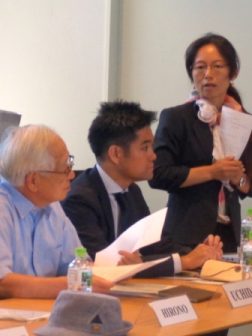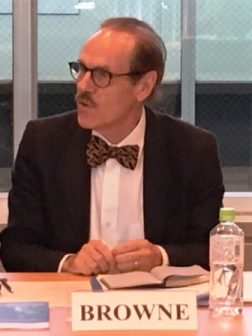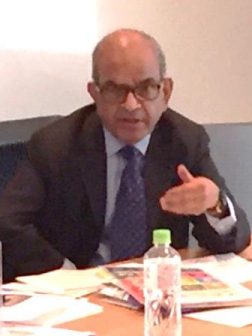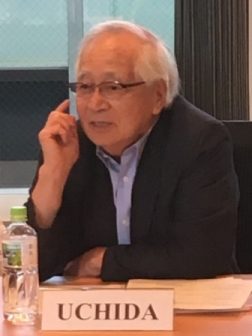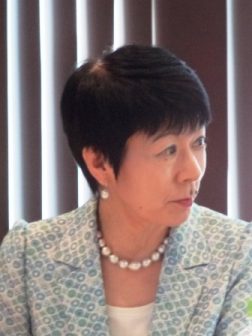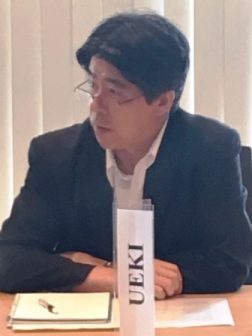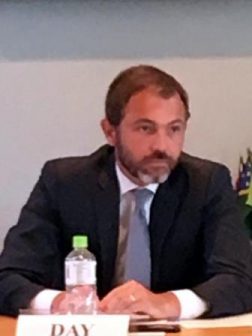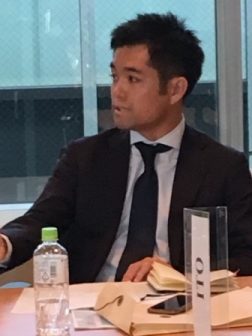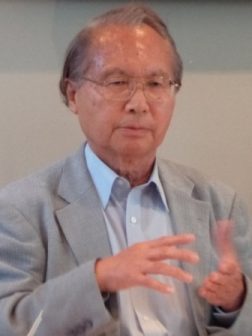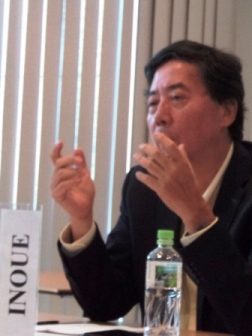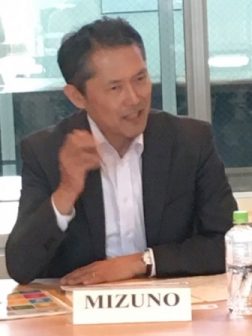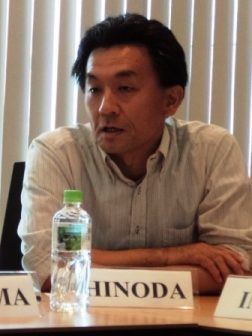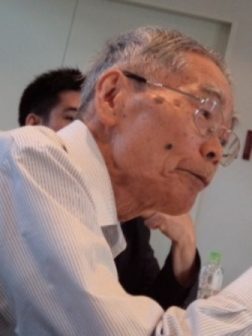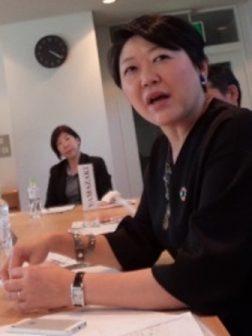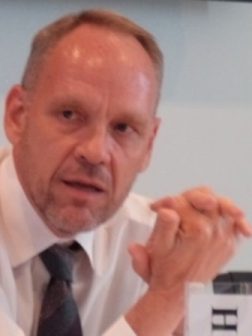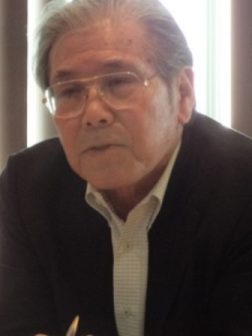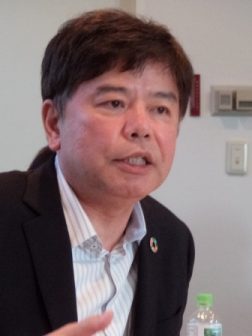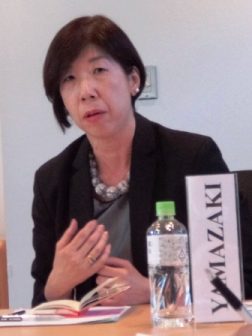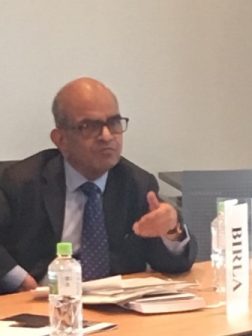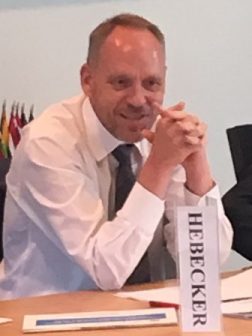Experts and practitioners exchanged their views and suggestions on how to revitalize the UN system.
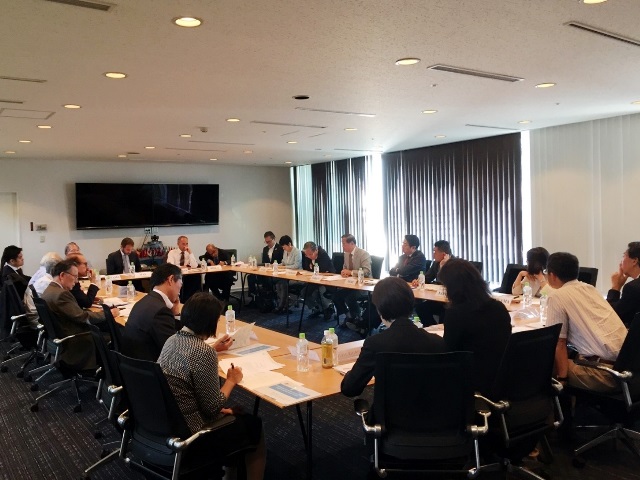
The meeting was opened by Prof. Ai Kihara-Hunt of the University of Tokyo (Deputy, ACUNS Tokyo Office)’s welcoming all the participants. Mr. Stephen Browne, Senior Member of ACUNS and co-founder of Future of UN Development System (FUNDS) made opening remarks. Mr. Stephen Browne has introduced ACUNS history and its activities in East Asian region. ACUNS’ China, Korea and Japan associations have been meeting together for 17 years. He referred to the perception that the UN is facing crisis, and called on the participants to make constructive and informal remarks in order to come up with ideas for revitalizing the UN.
Mr. Yukio Takasu, Under-Secretary-General and Special Advisor to the UN Secretary-General on Human Security, made a key note speech in his private capacity, not representing his official positions. He addressed three points in his speech: the said existential crisis of the UN, what is needed to revitalize the UN, and related issues for Japan.
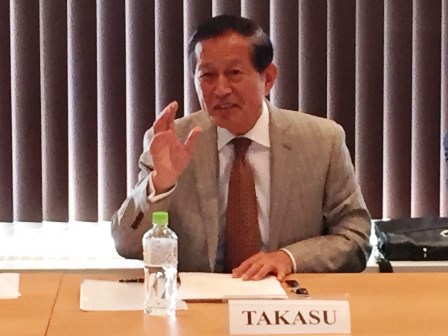
Session I was entitled“Revitalizing the UN system – International and Japanese Perspectives” and moderated by Prof. Sukehiro Hasegawa, Director of Academic Council on the United Nations System (ACUNS)’s Tokyo Office.
Mr. Masato Usui, Director of the United Nations Planning and Administration Division, Japan’s Ministry of Foreign Affairs, made an opening presentation. Mr. Usui mentioned that three areas are priority of the new Secretary-General: peace and security, management and development.
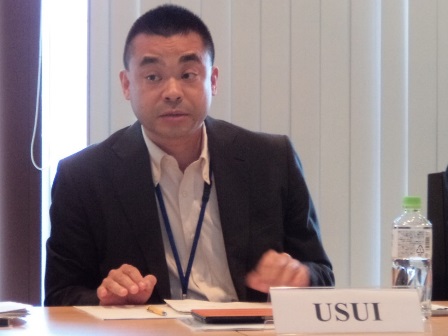
Prof. Takeo Uchida, former Professor at Chuo University, shared his opinion that the UN as a system is not in danger, but the UN Secretariat may be. The Secretariat may have been in retreat for 20 to 30 years by now. International civil service is in decline. The UN Secretariat is expected to play a crucial role in global governance in partnership with the Member States, civil society and business. It should therefore be strengthened and revitalized in order to respond to the challenges facing the humanity.”
Mr. Subhash Birla, senior member of ACUNS and Advocate at the Supreme Court of India, asked whether the UN reform is out of questioned. It is certain that Member States are not interested in budget increase. When one considers the possibility of East Asia being a group to interact with the UN, that group should not limit its relationship in relation to the UN. It should be a vehicle to outreach other regions in Asia, in Africa or others.
Prof. Yasuhiro Ueki of Sophia University stated that the problem is that no one is there to reform the UN. No superpowers are there, nor are there so-called middle powers such as Japan, Canada, the UK and India. In this circumstance, the UN must reassess its priorities. Peacekeeping is facing difficulties. Decisions are made at the Security Council (SC) but peacekeeping cannot follow them. There is a need for much more strategic decisions. The UN must decide, for example in South Sudan, that it would exit unless national leaders can come up with reconciliation plans. The UN currently lacks guts. Policy-oriented thinking is necessary. There needs to be think tanks to consider and advise on policies to the government and to the UN.
Prof. Akiko Yuge of Hosei University referred to Mr. Takasu`s observation that there is no momentum for major reform, but thought that optimistic elements exist to proceed with some reform. For overcoming negative elements, it is necessary to have appropriate actors take leadership, such as Member States and groups of Member States. Prof. Yuge asked Mr. Takasu what he sees as the window of opportunity. It is appropriate that more and more emphasis is put on conflict prevention, but this is one of the most challenging areas.
Mr. Adam Day of the Centre for Policy Research, UN University, agreed on the issue of momentum. He went further to indicate that the structural resistance is rising, including by the Group of 77 (G77). There are sovereignty barriers, but in fact incremental changes that have been made, such as regional offices in Central Africa, are under-rated. Where the real crisis exists is peacekeeping. Since 2010, MONUSCO has already faced a major budget cut, UNAMID is going to face the same, Haiti is shutting down except for police. In terms of finance, draft structure has been shared. For the Peace Fund involving UN Development Programme (UNDP), Peacebuilding Support Office (PBSO) and Department of Political Affairs (DPA), the UN’s financial structure would fit this group.
Mr. Takakazu Ito, Executive Officer at the Office of the Under Secretary-General of the UN, shared his opinion that Japan should focus on 2 points in relation to peace operations. One is personnel contribution. Japanese personnel are highly regarded, and Japanese Self Defence Force are highly disciplined. Currently Japan is providing engineering equipment in Nairobi and training for African troops. Hiroshima Peacebuilders Center is training civilian peacebuilders. Another point is procurement by the private sector. 90 percent of the UN procurement is related to peace operations. Japanese companies should register as venders and provide fuel, food rations and necessary goods for peace operations.
Mr. Sumihiro Kuyama, former Chairperson of the Joint Inspection Unit of the UN, mentioned that the themes of two panels in the meeting are interconnected. The UN should be revitalized around the issue of prevention. Prevention should not be limited to conflict prevention but should include everything, such as social prevention. If SDGs are targeting root causes of the conflict. If SDGs and prevention are combined, with a focus on root causes of the conflict, that would save resources and there may be a chance for the UN to be revitalized. For that front, a clear strategy is needed.
Mr. Ken Inoue of Japan International Cooperation Agency (JICA) stated the following points as his personal views. Regarding Mr. Takasu’s view on “UN passing”, the UN seems to be losing its charm and attraction as the leading international organization. This is because the values and principles of the UN defined in the UN Charter and the Universal Declaration of Human Rights are some 70-year-old, and these values and principles are nowadays challenged by non-western countries such as China and Islamic states. In order to revitalize the UN, therefore, it is essential to redefine meaning of human rights and democracy so that all member countries of the UN could share its values and principles. Global governance must be built on these common universal values and principles.
Prof. Hideaki Shinoda of Tokyo University of Foreign Studies shared his opinion on the role of Japan. Those who were disappointed at Japan’s withdrawal from South Sudan are a minority. The current challenging trend is difficult to change, and therefore it is important to focus on what the UN needs. There is increasing emphasis on regional differences. Southeast Asia has been the area where Japan tests conflict prevention strategies. The validity of peace can be checked through development. Japan needs strategic intervention. As it is visible from the issue of North Korea, in the area Japan is, there is no regional organization. That means that there is a lack of diplomatic tool. It is vital that Japan strengthen its cooperation with China and Korea, and perhaps also with Russia.
Prof. Takaaki Mizuno of Kanda University of International Studies mentioned that he gets an impression that the vision of the UN authority is decreasing. That is why the organization is micromanaged by Member States. It is important to reflect more ordinary people’s views on the vision of the UN.
Ms. Kaoru Nemoto of UN Information Center concurred with the state of UN passing. The UN needs the general public on its side, in particular youth. As it was clear from recent UN Special Rapporteur’s visit to Japan, it is important to have the public engaged. It would be helpful to have a Japanese Special Rapporteur to boost people’s interest. True human stories make people learn about mechanisms, and human rights is an important pillar of the UN for that.
Prof. Ryokichi Hirono, Professor Emirates of Seikei University, shared that reform was already discussed 60 years ago at the UN. There should be an additional freedom, freedom from environmental degradation, added to the two freedoms, from hunger and from fear, which the UN promotes. The UN should go back to the original mission. It should focus on only three things: peace of the world, advocacy and rule-setting. The operational side of economy should be left to the private sectors.
Mr. Stephen Browne concurred with Prof. Hirono on the three focuses. Aside from the optimism or pessimism, the challenge is the area for reform. Prevention is not a matter of changing chairs but of changing mindset. UNDP has never considered prevention. The speaker is not a fan of SDGs, as SDGs are incomplete. Real challenge is how to shape the agenda for individual countries. The civil society must be included, as the government would not reveal what is going wrong. One positive side is UMOJA, which forces every part of the UN to directly communicate with other parts.
Mr. Dirk Hebecker, UNHCR Representative in Japan, stated that simplification is necessary. Core matters relate to each of the UN and not to its 3 pillars. There are two different ways of thinking about UNHCR. One is that it is an advocacy agency and its role is to get Member States to deliver their obligations under the Refugee Convention. The other is that UNHCR needs to fill the gap created by Member States primarily through humanitarian activities. The speaker takes the latter view to avoid deaths.
Prof. Ryokichi Hirono clarified that he includes humanitarian activities to save lives within peace, which the UN must do.
Mr. Dirk Hebecker continued that UN actors should work together, but the One UN project was a failure. It is not recommended to reinvent the wheel. In Mr. Hebecker’s opinion, the UN’s strength is the high level of specialization. Cost saving should be done within each silo.
Mr. Kazuo Takahashi, Director for External Relations, JAUNS, opined that 3 different approaches to reform exist: muddle through, incremental and vision-led. With the international community going through a drastic change where the existential crisis of the United Nations is an integral part, it is the moment when we should find a way to go through a muddle-through process. Any attempt for a reform may invite a backlash at this moment. At the same time, we now should prepare ourselves for the next stage when a vision-led reform should be called for. For this purpose, the Japanese government should commission the UNU to conduct a feasibility study of a UN vision for the 21st century in a low key manner.
Prof. Shukuko Koyama, Assistant Professor at Waseda University, mentioned, in response to Mr. Ito’s comment, that procurement should be local, as local procurement is important for stable peace. Norm-setting is lengthy, but UN agencies have advantage in norm-setting.
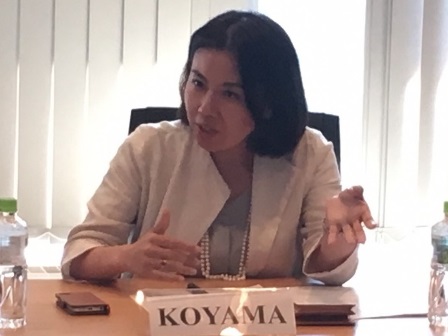
Prof. Hasegawa stated that it is important to construct a new international structure that accommodates emerging powers. Japan has fatigue in supporting the United Nations as it has not gained a permanent seat in the Security Council. But, the UN has been responsive to Japan`s aspirations so far in recognizing its status in economic and social organizations.
Mr. Yukio Takasu and Mr. Masato Usui made responding remarks.
Session II “Challenges for achieving the Sustainable Development Goals: Role of Japan” was moderated by Prof. Ryokichi Hirono.
Mr. Mikio Mori, Deputy Director-General for Global Issues, International Cooperation Bureau, Ministry of Foreign Affairs of Japan, made remarks to set foundation for the discussion.
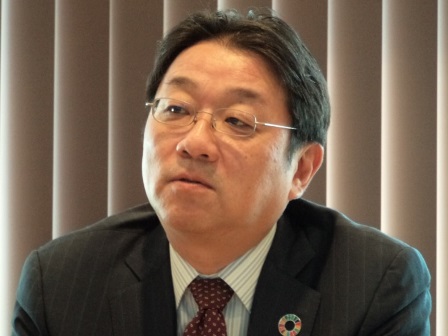
Mr. Tetsuo Kondo, UNDP Representative in Japan, stated that there are around 30 UN agencies to collaborate with the Japanese government and negotiate contributions. One important sector is the private sector. SDGs must be supported by everyone; in particular the private sector’s support is desperately needed. On the ground, there are SDG gaps. There are already companies that take SDG initiatives, such as Ajinomoto, Hitachi and d Toyota, but it is necessary to systematize the initiatives. One good example is the joint initiative by Fujitsu and Tohoku University, providing computer network. Japanese government joined this initiative. Companies are profit or business oriented. But there are rooms for involving them in the achievement of SDGs. The idea is that human development for everyone and not to leave anyone behind. It is important to consider who is currently left behind and focus on them.
Ms. Setsuko Yamazaki, former UNDP Country Director, opined that development is about transformation, and it is multi-sectoral and multi-disciplinary and it can pull together reforms and partnerships. SDGs will help push the UN. There is a problem of vision. People must be able to see, feel, touch and smell the mission statement so that they can contribute to the vision. In this regard, the speaker recommended translating conflict prevention through SDGs. The world is changing fast, and the UN must change accordingly with a transformational vision. Japan could consider to assist the SG in further developing his vision statement with support of the academia.
Ms. Kaoru Nemoto referred to the DESA ASG’s visit to Japan. His message was consistently holding two points: i) SDGs force us to work out of the silo – we have to speak to each other intrinsically, and ii) accountability by Member States at the highest level and also by world leaders vis-à-vis citizens. For that, in Ms. Nemoto’s opinion, social engagement and public information are crucial.
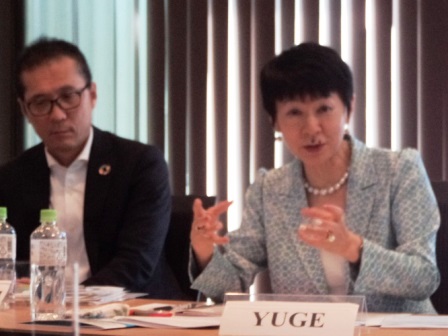
Prof. Akiko Yuge pointed out that the presentation by the MOFA official discussed SDGs in terms of a whole-of-government approach but she recommended having a whole-of-society approach. Japan’s role has two levels; one is achieving SDGs at the domestic level, and the other is to contribute at the international level. The Tokyo 2020 Olympic and Paralympic Games offer a good opportunity to advocate and showcase SDGs and involve many more stakeholders. Such efforts must start now, leading up to the event, and continue during and after the event. Japan’s role as an ODA provider is very important. With drastically increased flow of funds from the private sector, philanthropic organizations, and other sources, the role of ODA in general needs to be carefully considered, perhaps focusing more on poor or fragile countries and humanitarian crisis situations. She concurred with other speakers that it is important to more actively involve the private sector and youth. As Japan aims to become a role model in the achievement of SDGs, she asked the representative from MOFA how Japan plans to proceed in the medium to long-term, including any mid-point targets.
Prof. Shukuko Koyama asked how the impact should be measured in terms of private sector involvement in SDGs. Quality measurement is something that the UN can offer. The private sector should have a longer view than immediate profit. When one talks about the role of youth, does that mean mobilization of youth, or participation by youth? Youth are not indifferent, but are nuanced. They feel they should help others but also they need to help themselves. Human resource exchange may be a good way to involve them.
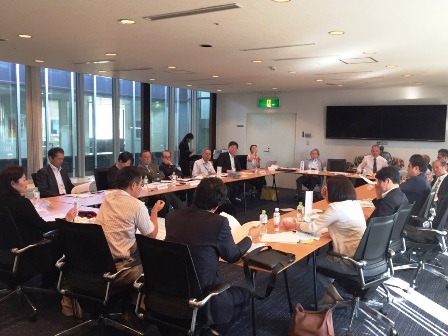
Mr. Sumihiro Kuyama shared that the SG mentioned the synergy between SDGs and peace and security. Goal 16 in particular is on peace and justice. In implementing SDGs, keeping Goal 16 in mind would help mitigate potential conflicts. Almost all SDGs address root causes of potential conflicts. It is important to establish conflict resistance conditions in every field. Integrated approach is crucial, but currently it is lacking. Mr. Kuyama mentioned that it is a good sign that the SG has it in mind.
Mr. Subhash Birla intervened and stated that African representatives have been meeting and implementing principles for the mid-point: 2019. The principles should be part of the long term policy for 2030.
Mr. Dirk Hebecker shared his opinion that Japan is in fact a leader and it is impressive how far-sighted and sophisticated its policies are. The policies are in fact institutionalized and implemented. There is a qualitative difference in how Japan has digested the concept of SDGs and how it implements assistance. The actual impact depends on how it is implemented. JICA has secondment in UNHCR, and vice versa is also the case. For monitoring, this is a unique setting, and there is no other example.
One important thing is education. For example, for Rohingya people, the international community is still paying for basic services after 25 years of displacement. This needs to change.
On the private sector, we need to help the UN develop a good and convincing guidance on why engaging with humanitarian agencies and SDGs is profitable to them. The UN needs to sell this as a business case. Companies need to see that investing on crisis brings returns to them.
Prof. Kazuo Takahashi stated that two questions exist: role model question and conceptual question. On the former, depending on how to set the implementation process, soft law can become hard law. Through SDGs, we can try and change the system. Political and legal setting can be changed. On the latter, through several years of negotiation, final agreement was reached based on the concept of earth boundary. SDGs brought geographical issues and social dimension together. We have to attempt to see the whole picture. The UN practice on review process is that each goal has its own measures. The key of SDGs now is how we try and translate global boundary related agreement into review process. Japan can support the process financially.
Prof. Yasuhiro Ueki stated that Japan can contribute tremendously in the area of SDGs. It is true that vision statement must be felt by people as part of their life. The question is how to do it. It is encouraging that there are private efforts to create SDG cities. In other words, some cities want SDGs as a guiding principle. It is a good example of what needs to be done locally. That kind of movement can create a good way for people to learn what is needed. There should be a Global Compact network in Japan. The challenge is to engage with domestic audience, and new issues including migration and terrorism. Japan needs to set concrete targets and see how people can take them.
Mr. Ken Inoue stated the following points as his personal views. It appears that both the Japanese government and NGOs are less interested in the SDG 16 “Peace, justice and strong institutions”, although this important goal is the precondition of all other goals, therefore, called the enabler of SDGs. This is probably because the Japanese government and JICA have been focusing only on technical cooperation in dealing with development agenda. The famous metaphor to show importance of technical cooperation, namely, “If you give fish to a poor man, he can eat one day, but if you teach how to fish, he can eat life time” was stated at least 40 years ago but JICA is still working on this obsolete assumption. The time has changed and the present metaphor should be “Even if a poor man leaned how to fish, fish are being depleted and he is excluded from fishing area. If the poor man learned he also has a right to fish, he could participate in building a better society to share limited fish”. The prime objectives of the SDG 16 are negative peace, good governance and democracy (people’s participation and human rights) but as indicated in the Japan’s SDGs Implementation Guiding Principles (page 35-36), Japan’s efforts for the SDG 16 is focusing only to technical cooperation such as translation of Japanese laws and regulations. Japan should focus more on democratic governance in their development cooperation to achieve the SDG 16.
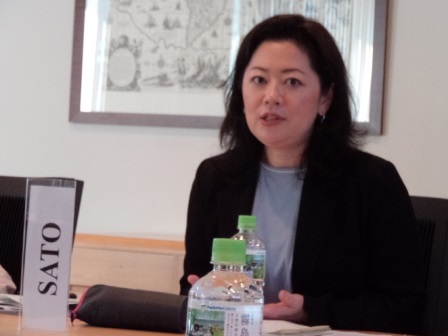
Ms. Mio Sato, Chief of Mission, IOM Tokyo, mentioned that migration has become the key issue. It is important to focus on the positive side of migration. It is suggested that robust and action-oriented Global Compacts on migration and refugees are critical to implementing SDGs. Ms. Sato also recommended focusing more on non-priority SDGs.
Mr. Stephen Browne referred to human development report. There are two prevailing paradigms in the UN: tri-sectoral one and normative one. The former, economic, social and environmental paradigm, is a wrong one. The latter one is normative paradigm, or human development paradigm. SDGs would strengthen human development framework. Human security, in particular in Japan, focuses on human rights and justice, and addresses most of the important behavioral elements more exclusively. SDGs can be reshaped more around human development. Mr. Browne agreed that the whole society needs to be brought together, but stated that it is vital to bring donors together. He asked how SDG monitoring process is indicated to Japan in light of the fact that there are as many as 244 indicators.
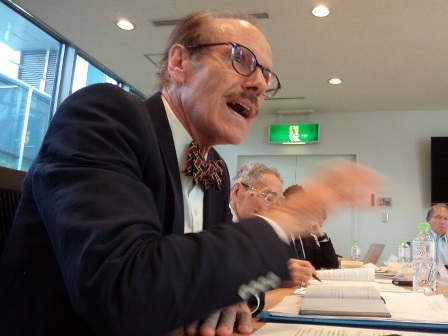
Mr. Tetsuo Kondo explained his chart, which showed four dimensions of private sectors in terms of financial returns for their activities. Charity in the chart means not recovering the cost immediately. Panasonic and Shiseido, for example, are not getting return for the moment. He stated that it may be necessary to be in the charity area for receiving returns in the future.
Prof. Ryokichi Hirono spoke of multi-stakeholder approach, and contended that we must learn more from past failure. Within the private sector, there are small business people. He questioned to what extent they are contributing to SDGs. He maintained that we should not be guided by all 244 indicators but to have a more global approach. He supported others’ statements that it is crucial to involve the general public.
Mr. Mikio Mori made comments on SDG16, peace and related Japan’s role.
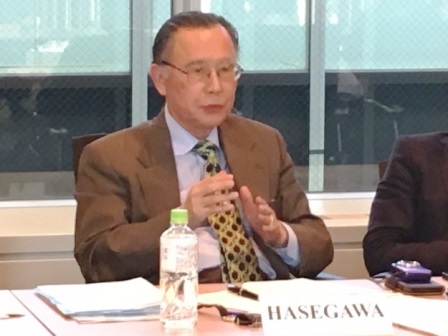
Prof. Sukehiro Hasegawa concluded the panel by stating that the UN is not in existential crisis, but it is important to review the raison d’être of the UN and to revitalize it based on that. Unless the peace and security structure is changed, that is impossible. The world seems to be reaching the stage where World War I began, with the rise of nationalism. It is an urgent task to find out how to prevent the world from going back to nationalism and populism. One is to continue finance and support UN peace operations. But, there is also a need to make accountable the leaders in conflict-torn countries and make them shape up at the same time. The other thing is that it may not be enough to teach people how to fish as there will not sufficient number of fish left. Einstein once stated that a problem cannot be solved at the level of thinking when the problem emerged. It is vital to bring academics, NGOs and all actors together to come up with a solution.
In closing the meeting, Prof. Kihara-Hunt delivered brief remarks of appreciation to all the participants.

